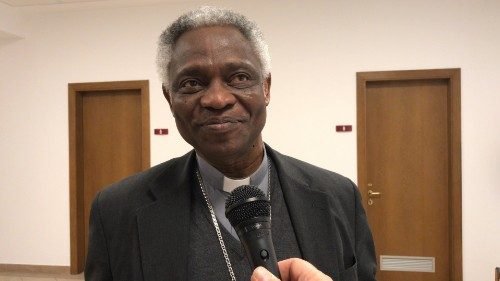The March 7-9 conference entitled, “Religions and the Sustainable Development Goals (SDGs) was presented at a press conference in the Vatican on March 5.
By Robin Gomes
A 2-day international conference in the Vatican this week will focus and reflect on how the world’s religions can help in implementing the Sustainable Development Goals (SDGs) that the United Nations member states set in 2015 to be achieved by 2030.
The March 7-9 conference entitled, “Religions and the Sustainable Development Goals (SDGs): Listening to the cry of the earth and of the poor”, is being jointly organized by the Vatican Dicastery for Promoting Integral Human Development and the Pontifical Council for Interreligious Dialogue.
Cardinal Peter Turkson, the prefect of the Dicastery for Promoting Integral Human Development, who presented the Vatican event at a press conference on Tuesday, said that the upcoming event is not about the progress made so far toward the 17 SDGs and 169 targets.
Marshalling the moral force
He said, “It is about marshalling the moral force of religion behind the implementation of the SDG goals. We need to work together; for no source of wisdom can be left out, just as no one can be left behind!”
“After four years from the adoption of the SDGs,” the Ghanaian said, “we have to realize even more clearly the importance to accelerate and tailor our actions to adequately answer to “both the cry of the earth and the cry of the poor” (Laudato Si’ 49).
Since the response to those cries has to be multi-layered, he said, we need to learn from the various cultural riches of different peoples, their art and poetry, their interior life and spirituality. This includes religion and the language particular to it.
Card. Turkson noted that some 80 percent of the world is said to be believing in God or some other being with many belonging to some religious group. The 70-year old cardinal said this is an immense potential to unleash the power of love to respond to the suffering of the earth and of the billions of people who have no access to adequate food, a decent dwelling, a secure and dignified job, and who are also the most affected by climate change.
Religions and development
In terms of development, Card. Turkson pointed out that religions play a crucial role in providing education, a cornerstone of civil society for centuries or millennia. According to UNICEF, the UN’s Children’s’ Fund, religions still provide or support 50% of all schools, and 64% of schools in sub-Saharan Africa.
Religious people, he continued, represent also the fourth largest identifiable investment community with around 12% of the total capital investment worldwide, and run around a third of all medical facilities of the planet.
With their rich religious narratives, he said, religions can contribute to a sustainable future, together with all societies and institutions.
Card. Turkson said that the Vatican conference is to help each other to foster an ecological and comprehensive conversionthat can transform the world. The cry of the earth and the poor, he said calls for an immediate and urgent response.
Fr. Bruno Marie Duffé, secretary of the Dicastery, who also addressed Tuesday’s press conference, noted that for a long time economic development was thought to be without limits but today many people look to religions for sustainable development.
Food
This fact was also stressed by René Castro Salazar, the Assistant-Director General of Climate, Biodiversity, Land and Water Department of the UN’s Food and Agriculture Organization, FAO.
He said that religions can draw on their tradition to suggest concrete solutions in the fight against food waste, such as in the past centuries when a part of the harvest was offered to the poorest population. When people complain there is not enough food for all on the Earth, he said, we throw away a third of it. “It would be enough to recover these wastes to solve the problem of the more than 800 million people who are in a state of food shortage,” Castro said.



